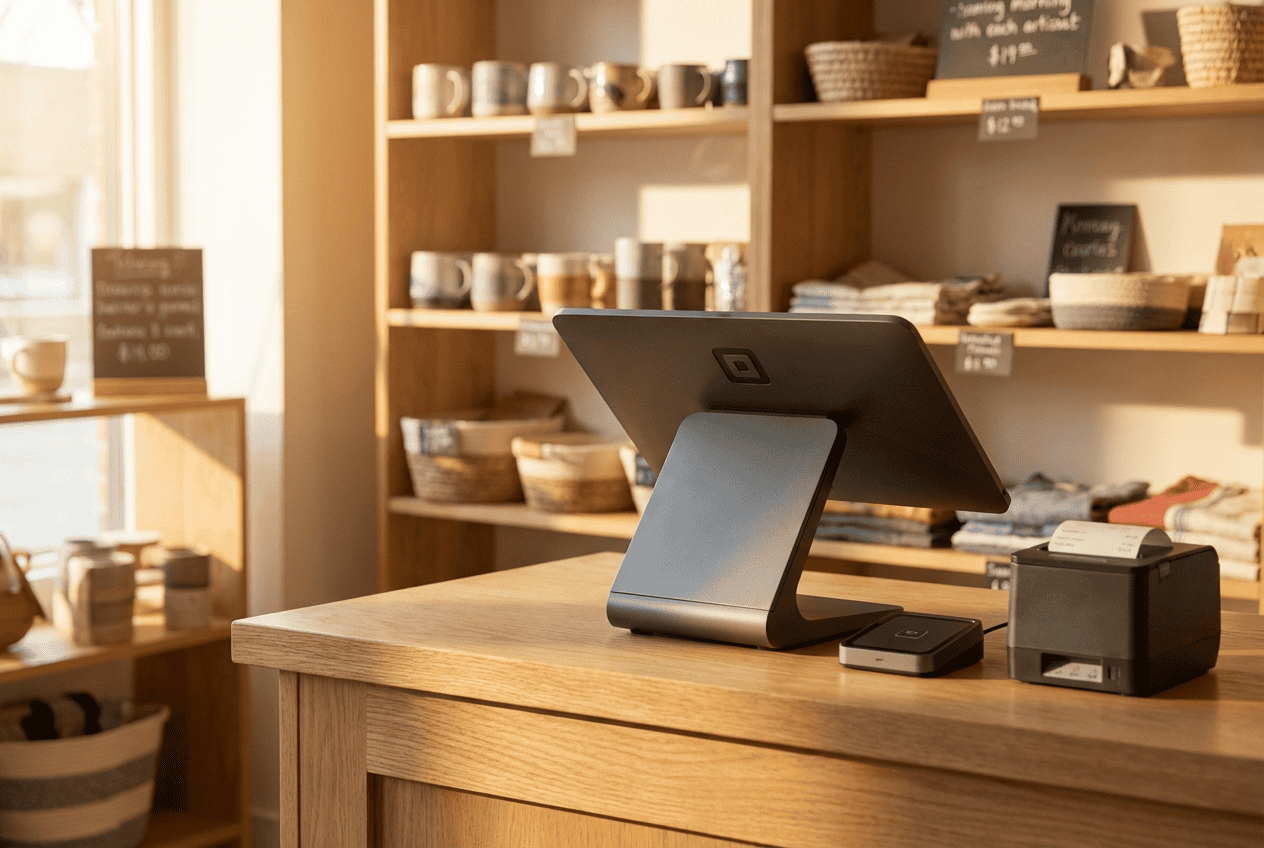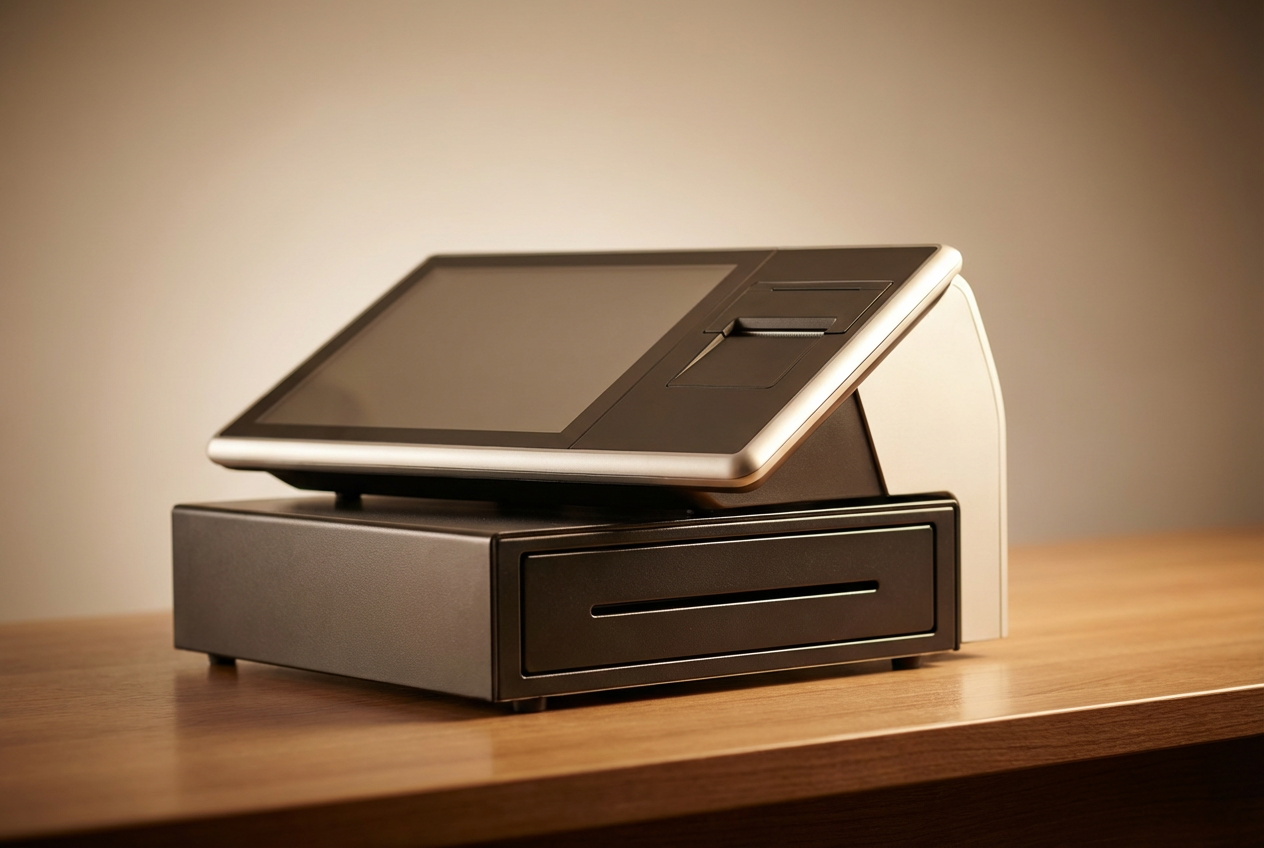A hybrid POS system is a point-of-sale solution that combines the benefits of cloud-based POS systems with the reliability of traditional on-premise POS systems. This setup allows retailers and restaurants to process transactions both online (cloud) and offline (local device) without disruptions.
When the internet is stable, a hybrid POS syncs data in real-time to the cloud, enabling centralized reporting, multi-store management, and remote access. If the internet goes down, the system seamlessly switches to offline mode, allowing sales, payment processing, and inventory updates to continue without interruption. Once reconnected, all data automatically syncs to the cloud, ensuring records remain accurate and complete.
Hybrid POS systems are ideal for businesses that require reliability during network outages while leveraging cloud capabilities for scalability and advanced features such as customer relationship management (CRM), automated reporting, and multi-device connectivity.
What Is a Hybrid POS System?
A hybrid POS system is a point-of-sale solution that merges cloud-based functionality with local on-device operations. It enables businesses to:
- Process transactions online and offline
- Sync sales and inventory data to the cloud automatically
- Continue operations seamlessly during internet outages
When connected to the internet, your sales, inventory, and customer data are synced in real time to the cloud, allowing owners to access reports, track multi-location sales, and manage remotely. If the internet goes down, the POS system switches to offline mode, allowing transactions to continue locally. Once connectivity is restored, all data syncs automatically, ensuring accurate records.
How Does a Hybrid POS System Work?
A hybrid POS system typically includes:
- Local device software: Installed on tablets, computers, or POS terminals for processing sales and printing receipts.
- Cloud synchronization: Real-time or scheduled syncing of sales, inventory, and customer data.
- Offline mode: Enables the system to store transactions locally during connectivity issues.
- Automatic reconciliation: Merges offline and online data once reconnected, ensuring no transaction is lost.
Example workflow:
- A sale is made on the POS terminal.
- If connected, it syncs to the cloud instantly.
- If offline, it saves the transaction locally.
- When internet is restored, transactions upload to the cloud and update reports.
Key Features of Hybrid POS Systems
Here are the most notable features:
- Offline Transaction Capability: Continue sales during outages without manual workarounds.
- Real-Time Cloud Sync: Instant updates to sales and inventory records.
- Multi-Store Management: Track sales across multiple locations in one dashboard.
- Advanced Reporting & Analytics: Access detailed sales, staff, and inventory reports remotely.
- CRM Integration: Manage customer data, loyalty programs, and marketing campaigns.
- Inventory Management: Automatic updates of stock levels to prevent overselling.
- Secure Payment Processing: Accept various payment methods with EMV and PCI compliance.
- Mobile POS Flexibility: Compatible with tablets and smartphones for line-busting and mobile checkout.
Hybrid POS vs. Traditional POS vs. Cloud POS
| Feature | Hybrid POS | Traditional POS | Cloud POS |
|---|---|---|---|
| Internet Dependency | Works online/offline | Offline only | Online only |
| Data Accessibility | Remote & local | Local | Remote |
| Real-Time Sync | Yes | No | Yes |
| Multi-Store Support | Yes | Limited | Yes |
| Offline Continuity | Yes | Yes | No |
| Hardware Requirements | Flexible | Dedicated | Flexible |
| Scalability | High | Low | High |
| Cost | Moderate | Higher upfront | Subscription-based |
Conclusion: Hybrid POS systems combine reliability during outages with the scalability of cloud technology, making them ideal for retailers, restaurants, and multi-location businesses.
Benefits of Hybrid POS Systems for Businesses
Here’s how a hybrid POS system can empower your operations:
►►► Optimal solution set for businesses: Multi store POS, Next-gen POS, Inventory Management Software (MSI), Self Service, Automation, Backorders

- Uninterrupted Sales Operations: Avoid transaction downtime and revenue loss during internet outages.
- Real-Time Business Visibility: Track your sales, staff performance, and inventory across locations from anywhere.
- Better Customer Experience: Faster checkouts and accurate stock visibility improve customer satisfaction.
- Scalability for Growth: Add new stores or devices without complex installations.
- Cost Efficiency: Reduce expensive hardware needs while retaining offline functionality.
- Enhanced Security: Cloud backups protect your data, while PCI-compliant transactions secure payments.
Industries That Benefit Most from Hybrid POS Systems
- Retail Stores: Clothing, electronics, supermarkets, and convenience stores.
- Restaurants & Cafes: Enable table-side ordering and offline payment processing.
- Pop-Up Shops: Operate in markets and events without worrying about connectivity.
- Multi-Location Chains: Centralized reporting and inventory control.
- Salons & Service Businesses: Seamless appointment scheduling and payments.
How to Choose the Right Hybrid POS for Your Business
When evaluating hybrid POS systems, consider:
- Offline Functionality: Check which features work offline (sales, inventory updates, loyalty).
- Ease of Use: Ensure your staff can navigate the system easily.
- Integration Capabilities: Connect with your accounting, eCommerce (Shopify, Magento, WooCommerce), and CRM systems.
- Hardware Compatibility: Support for existing or mobile devices.
- Scalability: Can the POS grow with your business?
- Customer Support: Availability of 24/7 support and training resources.
- Pricing Structure: Understand the upfront and recurring costs.
Top Hybrid POS Providers for 2026
Here are some leading hybrid POS systems worth considering:
- ConnectPOS: Best for retail with strong offline mode, multi-location management, and seamless Shopify/Magento integration.
- Square POS: Flexible, mobile-friendly, and supports offline payments with real-time sync.
- Lightspeed Retail: Excellent for retail and restaurants, with advanced inventory management and offline mode.
- Vend by Lightspeed: Easy to use with comprehensive inventory and offline sales support.
- Shopify POS: Hybrid POS for Shopify merchants with offline checkout and integrated eCommerce management.
Case Study: ConnectPOS as a Leading Hybrid POS Solution
ConnectPOS is a feature-rich hybrid POS system that helps businesses manage transactions, inventory, and customer data even during internet outages. With real-time cloud synchronization, detailed reporting, and seamless integration with Shopify, Magento, and BigCommerce, ConnectPOS is ideal for retailers looking to scale without operational interruptions.
Key advantages:
- Smooth offline-to-online syncing
- Barcode scanning and multi-payment support
- Centralized inventory control
- Multi-store management
- Mobile POS capabilities
Contact ConnectPOS today if you want a hybrid POS that aligns with your business growth while ensuring a seamless checkout experience.
Conclusion: Is a Hybrid POS System Right for You?
If your business needs reliable offline transactions while leveraging cloud benefits for scalability, remote management, and analytics, a hybrid POS system is your best option in 2026 and beyond. It offers the perfect blend of security, flexibility, and advanced features to optimize your checkout process, improve customer experience, and support your expansion goals.
You’ll have a scalable system that expands your business if you pick up a hybrid POS with regular upgrades and multiple functions. To know more about this aspect, connect us now to receive informative advice and the best solution for your business.
►►► Optimal solution set for businesses: Shopify POS, Magento POS, BigCommerce POS, WooCommerce POS, NetSuite POS, E-Commerce POS




